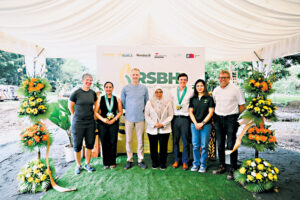The Philippines’ first Rice Straw Bioenergy Hub was officially launched in Pila, Laguna on Oct. 7, bringing together national leaders, local officials, international partners, and farmers to showcase groundbreaking solutions that transform rice straw from waste into valuable products.
The event was attended by the Economic and Climate Counsellor Lloyd Cameron of the British Embassy Manila, Regional Executive Director of the Department of Agriculture (DA) Region IV-A Fidel L. Libao, Chair of the Committee on Agriculture for the Province of Laguna, Hon. Karla Adajar-Lajara, representatives from other DA agencies, institutional partners, farmer leaders, and local government officials from the province of Laguna.
The Hub demonstrates how rice straw, an abundant but often wasted by-product of rice farming, can be transformed into valuable products such as renewable energy, biochar, and soil amendments. This innovation offers solutions to some of the Philippines’ most pressing challenges in rice farming: open-field burning, greenhouse gas emissions, high production costs, and low farmer incomes.
The Hub, developed by Straw Innovations, Inc. with partners Aston University, Southeast Asian Regional Center for Graduate Study and Research in Agriculture (SEARCA), Koolmill Systems, Takachar, and Innovate UK, demonstrated how rice straw can be upcycled into biochar, renewable energy, soil amendments, and livestock bedding while also providing farmers with new business opportunities and reducing harmful methane emissions.
At the launch, participants witnessed live demonstrations of new technologies such as Straw Traktor, a world-first 3-in-1 machine capable of collecting rice straw even in wet conditions, while simultaneously spreading soil amendments and rotavating the land. Also featured was the Takavator, developed by Takachar, a portable system that converts rice straw into biochar — an innovation that enhances soil health and opens up opportunities for carbon credits.
The event also showcased Koolmill, a next-generation rice mill that consumes up to 90% less energy and minimizes grain breakage, allowing farmers and processors to increase their profits. In addition, a live demonstration on biogas production showed how low-quality rice straw can be repurposed to generate clean, renewable energy for rural communities.
Beyond technology, the Hub is designed to put farmers at the center of innovation. By making machinery financially accessible, local farmers and entrepreneurs can run profitable businesses offering harvesting and land preparation services. In pilot sites, some operators have already improved their livelihoods to the point of renovating their homes and supporting their families’ education.
Rice straw is also being piloted as deep-litter bedding for swine farmers, reducing waste management costs and producing compost as an additional income source. These early interventions demonstrate how straw management can support farming communities socially, economically, and environmentally.
SparkUp is BusinessWorld’s multimedia brand created to inform, inspire, and empower the Philippine startups; micro, small and medium enterprises (MSMEs); and future business leaders. This section will be published every other Monday. For pitches and releases about startups, e-mail to bmbeltran@bworldonline.com (cc: abconoza@bworldonline.com). Materials sent become BW property.
